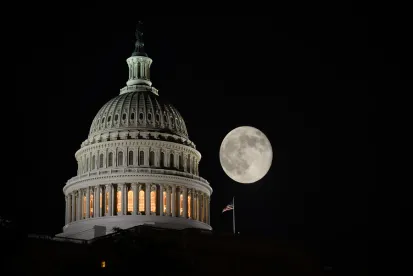Despite its well-deserved reputation as an employee-friendly jurisdiction, the District of Columbia is absent from the list of “blue states” that have adopted legislation limiting the use of noncompete agreements. Over the last few years, states such as Illinois, Maryland, Massachusetts, New Hampshire, Oregon, Rhode Island, Virginia, and Washington have enacted such laws. Legislation titled the “Ban on Non-Compete Agreements Amendment Act of 2019,” Bill 23-494 (B23-0494), was introduced in the District of Columbia about a year ago, but the Council of the District of Columbia referred the proposal to its Committee on Labor and Workforce Development and has not taken action since then.
This period of inaction may be coming to an end. The committee is dusting off B23-0494 and is currently planning a markup and vote on it this month. The goal is to have the legislation passed by the full Council before the current legislative period expires on December 31, 2020. Observers will be interested to see whether and how the markup may be impacted by the progressive tailwinds of the soon-to-be Biden–Harris White House.
Scope and Coverage
As introduced, B23-0494 effectively prohibits employers from entering into noncompete agreements with employees whose “rate of pay” is equal to or less than three times the minimum wage. Using the current D.C. minimum wage of $15 per hour, the bill would apply to employees earning up to $45 per hour. In terms of its coverage, the bill borrows the definitions of “Employee” and “Employer” from the Minimum Wage Act Revision Act of 1992 (D.C. Law 9-248; D.C. Code §§ 32-1002(2) and 32-1002(3)), meaning that an employer subject to that law would be covered.
Agreements and Policies Prohibited
In its current version, B23-0494 would prohibit an employer from requiring an employee to sign an agreement that includes a noncompete provision, which is defined as “a term of a written agreement between an employer and an employee that restricts or bars the employee from being simultaneously or subsequently employed by another employer (A) [i]n a particular geographic region; or (B) [f]or an indefinite or specified period of time.” The bill would make such an agreement entered into on or after the effective date of the legislation void as a matter of law. The bill also would prohibit an employer from having a workplace policy that limits the right of a covered employee to be simultaneously or subsequently employed by another employer in a particular geographic region or for an indefinite or specified period of time. Finally, the bill would prohibit an employer from retaliating against an employee for failing to comply with such an agreement or policy. Retaliation against an employee for asking or informing the employer (or others) about the validity of an agreement or policy the employee reasonably believes violates the legislation also would be prohibited.
The bill contains a grandfather clause for existing agreements. Specifically, a noncompete provision that is contained in an agreement entered into before B23-0494’s effective date would not be rendered void. However, the bill does not have a parallel grandfather clause to preserve workplace policies that were established before the bill’s effective date.
Savings Clause
The bill does not contain any express exceptions or carve-outs, but only a single savings clause. That clause states, “Nothing in this title is intended to impair an employer’s ability to place reasonable restrictions on an employee’s right to request or use leave from work, provided such restrictions do not violate the laws of the District of Columbia or the United States.” Ostensibly, this provision aims at B23-0494’s language prohibiting an employer from having a “workplace policy that limits the right of [covered] employees … from being simultaneously … employed by another employer … for an indefinite or specified period of time.” (Emphasis added.)
As written, this language would make it unlawful for an employer to prohibit an active employee from working for a direct competitor during pre- or post-work hours, on weekends, during days off, or even during the workday itself. By preventing an employer from restricting the activities of a current employee, the bill’s authors are creating a significant problem. Unlike a former employee who goes to work for a competitor, a current employee has real-time access to the employer’s active or proposed business plans, not merely historical knowledge of what those plans used to be. If a D.C. employer cannot prevent a current employee from working for a direct competitor, it will be unable to protect its business from being undermined by a disloyal employee.
The savings clause would not offer an employer meaningful protection. It would permit reasonable restrictions on outside employment only in circumstances when an employee requested or used “leave from work.” As written, the savings clause would not apply in the ordinary circumstance in which an employee works for a competitor during off-duty hours. Unless the D.C. Council rewrites the savings clause, it offers an employer only the illusion of protection.
Applicability to Nonsolicitation Agreements
Unlike legislative restrictions on noncompetes in some states, D.C.’s bill does not currently contain an express carve-out for agreements not to solicit an employer’s customers or employees. By comparison, the Massachusetts Noncompetition Agreement Act excludes “covenants not to solicit or hire employees of the employer” as well as “covenants not to solicit or transact business with customers, clients, or vendors of the employer.” Similarly, the Revised Code of Washington excludes nonsolicitation agreements, confidentiality agreements, and covenants prohibiting use or disclosure of trade secrets from the definition of “noncompetition covenant.”
It is possible to argue that an exception for nonsolicitation agreements is not necessary. The reasoning would be that an employee’s agreement not to solicit customers or employees of his or her employer does not, by its nature, “restrict[] or bar[]” the employee from “being … employed by another employer” either in “a particular geographic region or “[f]or an indefinite or specified period of time.” Nonetheless, as with any new legislation, there are bound to be disputes about the bill’s intended scope. By not including in the bill an express exclusion for nonsolicitation agreements, as the state legislatures in Massachusetts and Washington did, the D.C. Council could be leaving the door open for litigation on this issue. Certainly, the added clarity of a carve-out for nonsolicitation agreements would be welcomed by employers and could obviate some amount of litigation over statutory interpretation.
Use of Confidential or Proprietary Information
As written, B23-0494 also omits language clarifying its applicability to agreements that prohibit an employee from using or disclosing his or her employer’s confidential or proprietary information. States such as Massachusetts and Washington have included language expressly excluding agreements protecting confidential and proprietary information from the sweep of their legislation proscribing noncompete agreements. Language clarifying that D.C.’s bill does not invalidate or proscribe the enforcement of agreements prohibiting the use or disclosure of confidential or proprietary information would ensure the validity of agreements protecting the legitimate interests of employers and avoid unnecessary litigation over the intended scope of the bill.
Sales of Businesses
The bill does not currently contain language exempting noncompete provisions included in agreements entered into in connection with sales or purchases of ownership interests in businesses. Even California, long known for its robust prohibition of restrictive covenants as void against public policy, permits noncompete agreements in connection with sales of businesses. Including a sale-of-business exemption in noncompete legislation reflects basic common sense, since a purchaser is unlikely to buy a business from someone who is going to continue to compete against that business. Unless an employee can sign an enforceable noncompete covenant when a business is sold, the bill could make it difficult, if not impossible, for a business owner to find a buyer for its interests.
Penalties and Compliance
The bill contains provisions establishing fixed amounts of liability ranging from $500 to $2,000 per violation per employee, depending on the offense. Should the bill become law, an employer’s mere non-enforcement of offending agreements or policies will not suffice to escape liability. That is because the act of requiring a covered employee to sign an agreement with a noncompetition provision exposes an employer to liability to each employee who signs. Similarly, an employer that maintains a policy in violation of the bill would face liability based upon the number of employees subject to the unlawful policy. To limit civil liability, an employer that requires new hires to sign agreements with noncompete provisions may want to consider affirmatively limiting the signatories to employees paid above the pay level set by the bill. An employer that maintains noncompete provisions in policies may want to consider adding specific policy language excluding employees paid less than the bill’s threshold.
Legislative Prospects
The final contours of B23-0494 may be influenced by similar legislation recently enacted in neighboring Maryland and Virginia. In 2019, Maryland adopted a law prohibiting employers from entering into noncompete agreements with employees making less than $15 per hour or $31,200 per year. Virginia followed in 2020 by prohibiting noncompete agreements for employees earning less than the average weekly wage in the Commonwealth (roughly $1,200 per week or roughly about $60,000 per year). The version of D.C.’s bill introduced last year would prohibit noncompete agreements for workers at income levels higher than the level at which Maryland drew that line but below the level at which Virginia drew the line.
As the D.C. Council marks up the bill, it will have to decide how broad a segment of the workforce to cover and what types of exclusions or carve-outs to incorporate. The D.C. Council could stay with the “low wage” approach adopted in Maryland and Virginia or go with an approach that is more aggressive. Should the legislative markup result in something akin to an all-out ban, the D.C. Council could give businesses a reason to relocate their D.C. offices to nearby Virginia or Maryland. A low-wage cutoff similar to what Maryland and Virginia adopted would mitigate that risk. We may know better in the next few weeks which path the D.C. Council ultimately chooses to follow.




 />i
/>i

